SAMOKOV, Bulgaria (August 20) -- Four bouts, a combined score of 40-0, and a total time on the mat of five minutes and 24 seconds -- all matches finished inside the first period.
Sakura ONISHI (JPN) put on one of the most dominant performances at the World U20 Championships, becoming a two-time world champion by winning the 59kg gold in Samokov, Bulgaria, on Wednesday.
The Japanese wrestling phenom spent less time on the mat than a full six-minute wrestling match and won all bouts with a 10-0 score, just like she did in 2024. Onishi has now outscored her opponents 80-0 over the two tournaments.
After three wins on Tuesday, Onishi faced Karin SAMUELSSON (SWE) in the final. She locked Samuelsson's legs around her head, turning her four times after the takedown. She used the technique on three of her four wins.
"I didn't want to finish quickly. I wanted to focus on winning each point and play the match with that focus," Onishi said.
Onishi feels that she has improved technically since last year, especially after winning the senior Asian Championships in which she faced stiff competition.
"I've been working on improving in various ways," she said. "I wanted to aim even higher in terms of technique and physical strength. The fact that I wasn't defeated in the senior category boosted my confidence. Winning the Asian Championships and Ranking Tournament in Tirana also boosted my confidence."
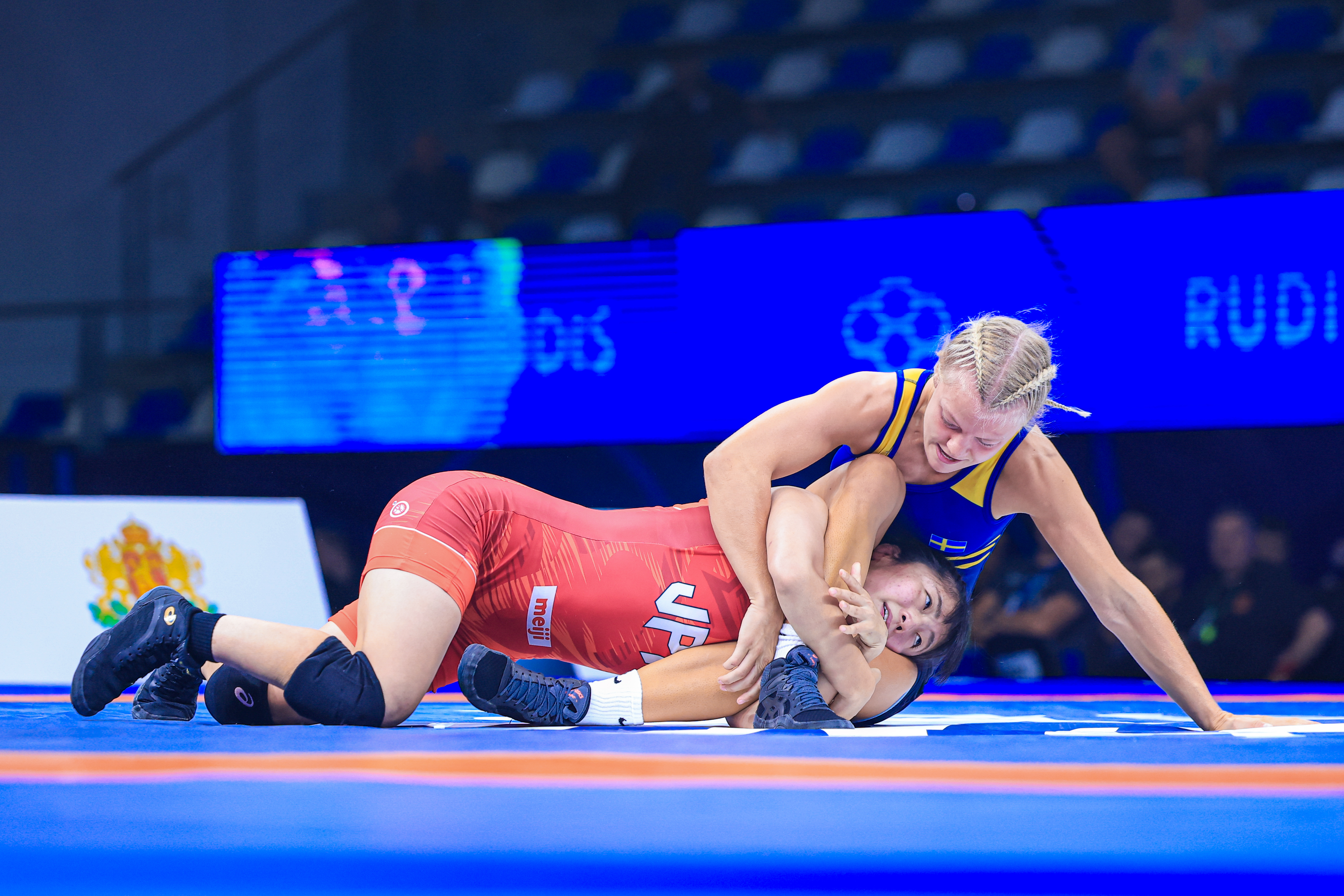 Sakura ONISHI (JPN) uses her trademark lace against Karin SAMUELSSON (SWE) in the 59kg final. (Photo: United World Wrestling / Amirreza Aliasgari)
Sakura ONISHI (JPN) uses her trademark lace against Karin SAMUELSSON (SWE) in the 59kg final. (Photo: United World Wrestling / Amirreza Aliasgari)
Next for Onishi is the senior World Championships in September as she prepares to win the world title in Zagreb as well. To prepare for that she wanted to test herself again in this age group.
"The World Championships are coming up, and I think this category is just one step in the process," she said. "I think I've taken a good step forward, and I definitely want to win the senior World Championships."
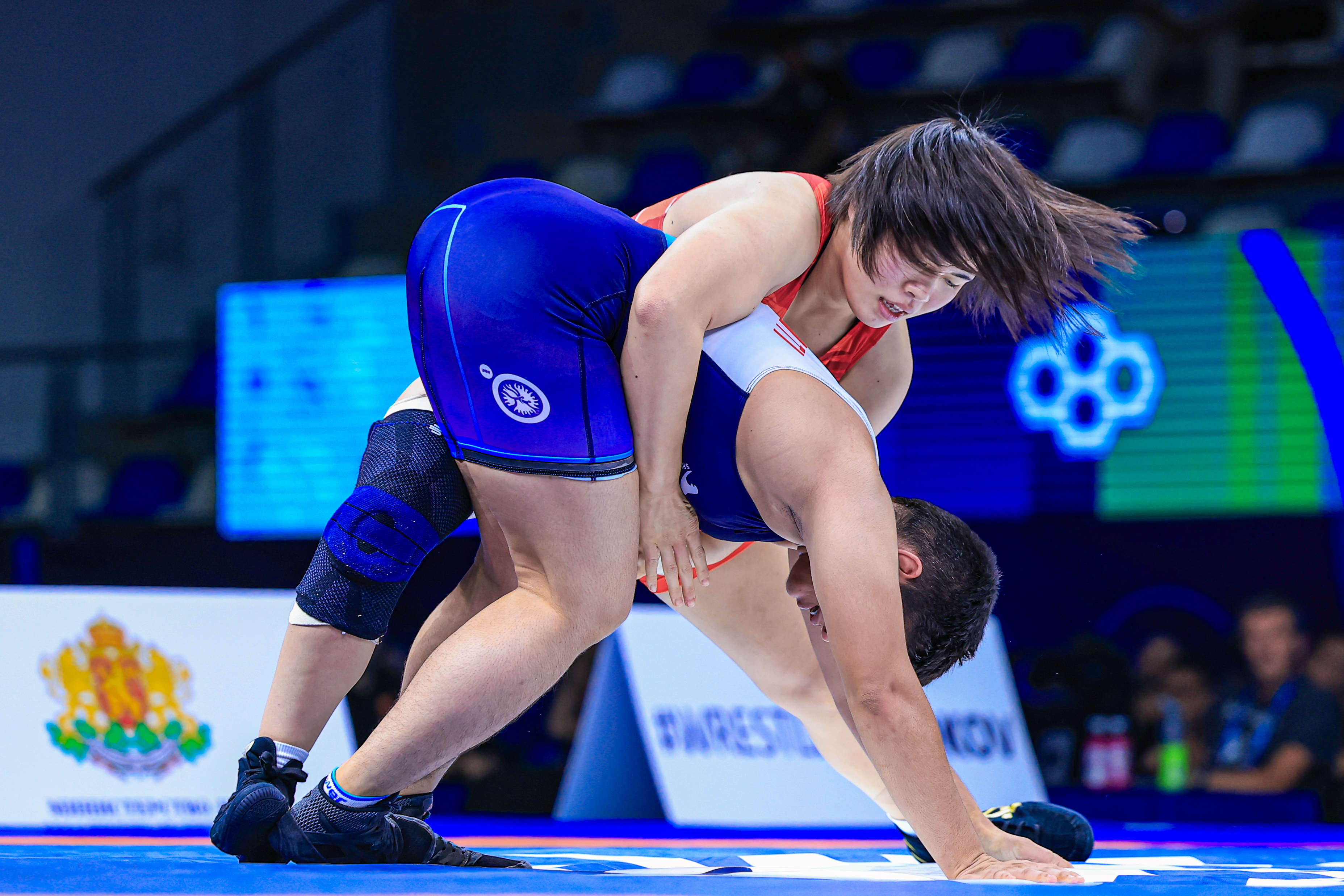 Ray HOSHINO (JPN) works on a takedown against SRISHTI (IND) in the 68kg final. (Photo: United World Wrestling / Amirreza Aliasgari)
Ray HOSHINO (JPN) works on a takedown against SRISHTI (IND) in the 68kg final. (Photo: United World Wrestling / Amirreza Aliasgari)
Japan won its second gold medal through Ray HOSHINO (JPN), who also won her second World U20 title. Hoshino, the 2023 world U20 champion, showed no signs of rust in her 7-0 hammering of SRISHTI (IND) in the 68kg final in Samokov.
Srishti, a returning bronze medalist, tried to score on Hoshino, but the Japanese wrestler overpowered her and clearly had a better game plan for the final bout.
Hoshino scored the first takedown of the final and then added a step-out to take a 3-0 lead. She then scored a go-behind to extend her lead to 5-0 at the break. An ankle pick during Srishti's attack gave Hoshino her third takedown of the match and a 7-0 lead she kept until the end.
India crowned one champion on Wednesday when TAPSYA (IND) defeated the European U20 champion, Felicitas Domajeva (NOR), 5-2, to win the 57kg gold medal.
In a match decided by a single move, Tapsya scored a takedown and used an arm-bar to pin Domajeva, who survived the attempt but fell behind 5-0 as she had already conceded a point for passivity.
In the final seconds of the bout, Domajeva scored a takedown, but it was harmless to Tapsya, who defended any turn attempts to win 5-2 and India's first gold in Samokov.
The loss ended hopes for Domajeva to win the first world U20 gold medal for Norway in 37 years. She had became the first Norway wrestler to enter the World U20 Championships final in Women's Wrestling in 15 years.
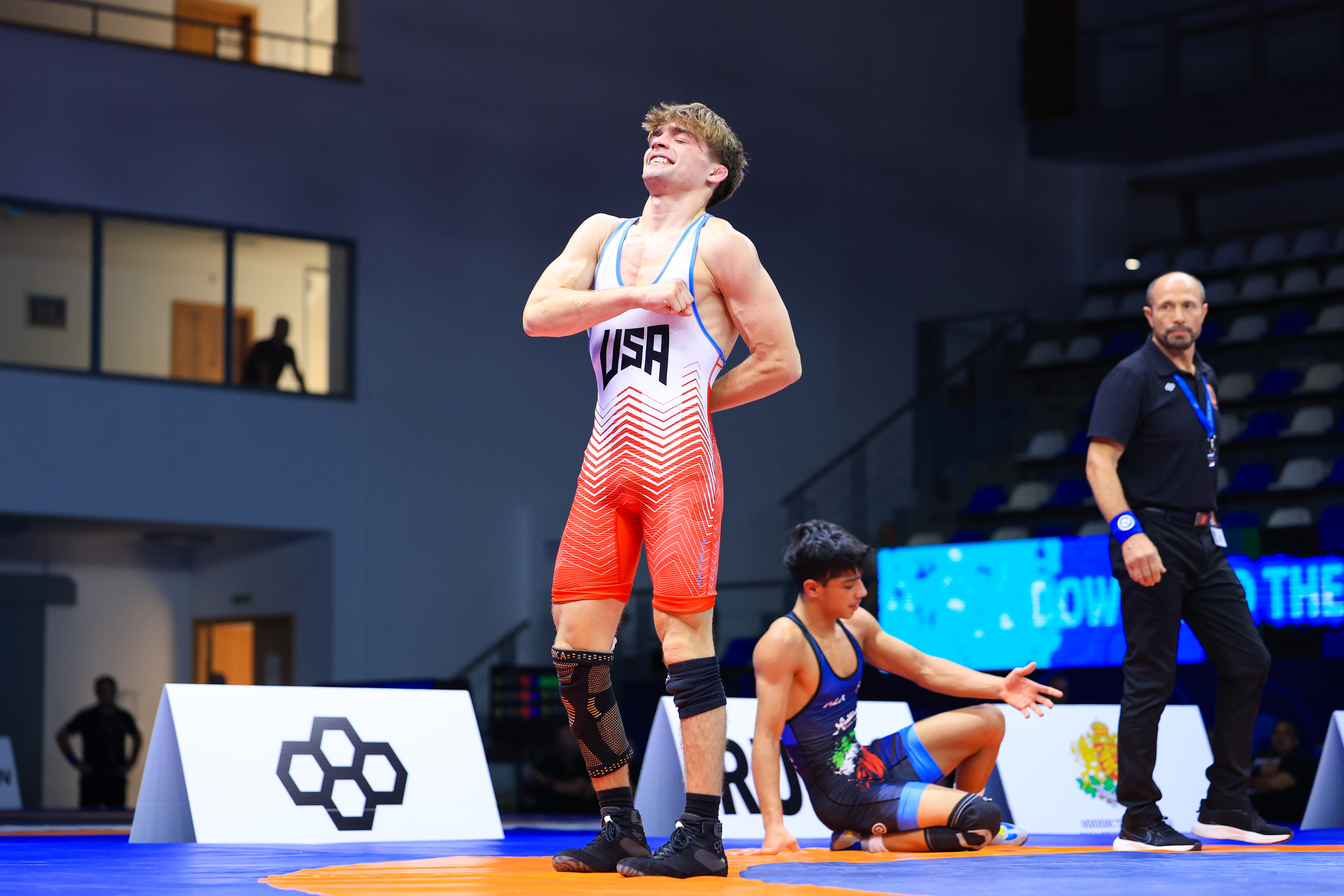 Marcus BLAZE (USA) celebrates, like his roommate at Penn State Masanosuke ONO (JPN), after winning the 61kg final. (Photo: United World Wrestling / Kadir Caliskan)
Marcus BLAZE (USA) celebrates, like his roommate at Penn State Masanosuke ONO (JPN), after winning the 61kg final. (Photo: United World Wrestling / Kadir Caliskan)
U.S. defends Freestyle title
Marcus BLAZE (USA) upgraded his bronze medal from last year to a gold medal, and Maxwell MCENELLY (USA) won the gold medal in the 86 kg weight class as the United States successfully defended its freestyle team title at the World U20 Championships. With five gold medals, the U.S. had its best showing in the competition's history since 1984.
Blaze, who lost to the Japanese world champion Masanosuke ONO (JPN) last year, defeated a former world U17 champion Ahora KHATERI (USA), 10-0, in the final, his fourth win via technical superiority.
With his gold medals at the World U17 and U20 Championships, Blaze joins an elite group of wrestlers who have won world titles at both the U17 and U20 levels.
In Samokov, Blaze demonstrated that he will be a formidable opponent at the senior level as well. He wrestled with solid positioning and scored with various techniques. In the final match, he wrestled Khateri patiently, scoring five stepouts in the first period. A caution against Khateri made it 6-0, and then a go-behind and turn by Blaze made it 10-0.
"I feel good," Blaze said. "I wrestled pretty well. Throughout the tournament, I just kept getting better and better. I feel good about it. Our coaches gave me a game plan, and I stuck to it."
Before the final match, Blaze received a text message from his high school coach, Scott BURNETT, who explained Khateri's wrestling style and told Blaze to "suffocate" his opponent.
"When I was really young, my coach always said to be in a great position the whole time," he said. "Before the final, he told me to suffocate my opponent, and I feel like that's what I did out there."
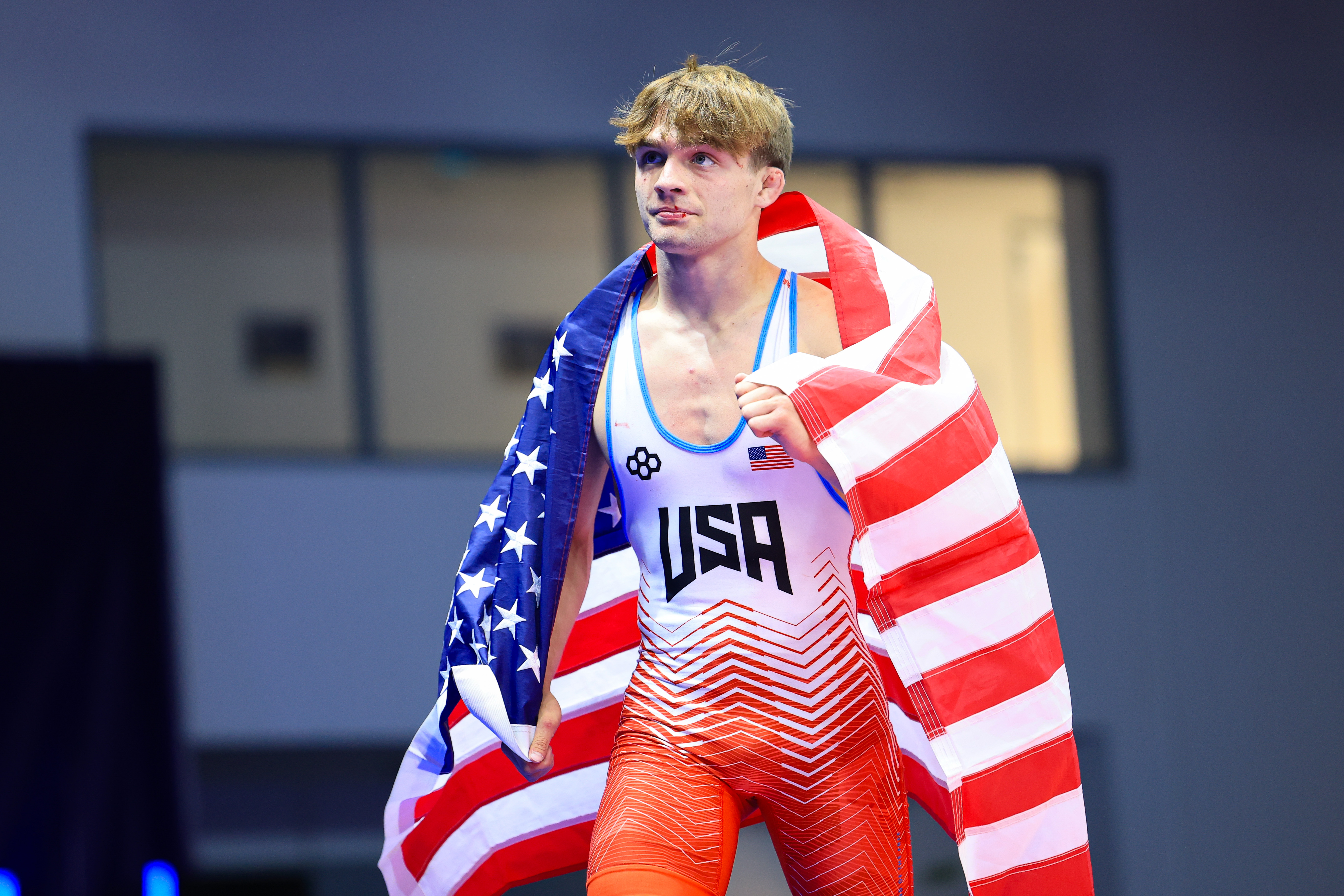 Marcus BLAZE (USA) is now a world U17 and U20 champion. (Photo: United World Wrestling / Kadir Caliskan)
Marcus BLAZE (USA) is now a world U17 and U20 champion. (Photo: United World Wrestling / Kadir Caliskan)
In his international career, Blaze has lost only once — to Ono in 2024 — but now, both wrestlers train at Penn State in the United States. After winning the gold medal, Blaze imitated Ono's 2024 celebration after the Japanese had won gold at the U20 World Championships.
"I live with Ono; he's my roommate," Blaze said. "He's a great person. At that time, he was just way better. I'm thankful to be able to wrestle with him every single day."
The second gold medal for the U.S. came from McEnelly, who defeated Bozigit ISLAMGEREEV (UWW) 8-0 at 86 kg.
McEnelly prevented Islamgereev from attacking his legs and wrestled at a fast pace throughout the final. He scored four takedowns to shut out Islamgereev.
RESULTS
Women's Wrestling
57kg
GOLD: TAPSYA (IND) df. Felicitas DOMAJEVA (NOR), 5-2
BRONZE: Dolzhon TSYNGUEVA (UWW) df. Sowaka UCHIDA (JPN), via inj. def.
BRONZE: Anna STRATAN (KAZ) df. Tindra DALMYR (SWE), 9-3
59kg
GOLD: Sakura ONISHI (JPN) df. Karin SAMUELSSON (SWE), 10-0
BRONZE: Hiunai HURBANOVA (AZE) df. Ella FINDING (CAN), 4-1
BRONZE: Yifan ZHU (CHN) df. Aubre KRAZER (USA), 5-3
68kg
GOLD: Ray HOSHINO (JPN) df. SRISHTI (IND), 7-0
BRONZE: Eduarda RODRIGUES BATISTA (BRA) df. Laura KOEHLER (GER), via fall
BRONZE: Odzaya ERDENEBAT (MGL) df. Oleksandra RYBAK (UKR), 9-8
Freestyle
61kg
GOLD: Marcus BLAZE (USA) df. Ahora KHATERI (IRI), 10-0
BRONZE: Omar AYOUB (PUR) df. Adlan SAITIEV (UWW), 8-6
BRONZE: Magomedkhan MAGAMEDKHANOV (UWW) df. Sargis BEGOYAN (ARM), 12-11
86kg
GOLD: Maxwell MCENELLY (USA) df. Bozigit ISLAMGEREEV (UWW), 8-0
BRONZE: Abolfazl RAHMANI (IRI) df. Razmik YEPREMYAN (ARM), 4-2
BRONZE: Ahmet YAGAN (TUR) df. Ryogo ASANO (JPN), 9-3


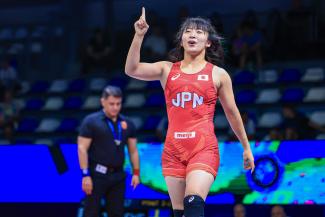
 Sakura ONISHI (JPN) uses her trademark lace against Karin SAMUELSSON (SWE) in the 59kg final. (Photo: United World Wrestling / Amirreza Aliasgari)
Sakura ONISHI (JPN) uses her trademark lace against Karin SAMUELSSON (SWE) in the 59kg final. (Photo: United World Wrestling / Amirreza Aliasgari) Ray HOSHINO (JPN) works on a takedown against SRISHTI (IND) in the 68kg final. (Photo: United World Wrestling / Amirreza Aliasgari)
Ray HOSHINO (JPN) works on a takedown against SRISHTI (IND) in the 68kg final. (Photo: United World Wrestling / Amirreza Aliasgari) Marcus BLAZE (USA) celebrates, like his roommate at Penn State Masanosuke ONO (JPN), after winning the 61kg final. (Photo: United World Wrestling / Kadir Caliskan)
Marcus BLAZE (USA) celebrates, like his roommate at Penn State Masanosuke ONO (JPN), after winning the 61kg final. (Photo: United World Wrestling / Kadir Caliskan) Marcus BLAZE (USA) is now a world U17 and U20 champion. (Photo: United World Wrestling / Kadir Caliskan)
Marcus BLAZE (USA) is now a world U17 and U20 champion. (Photo: United World Wrestling / Kadir Caliskan)
Share your thoughts.
Comments